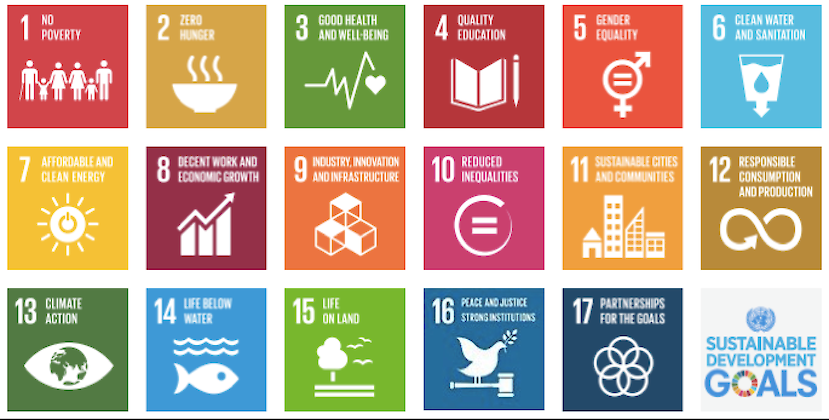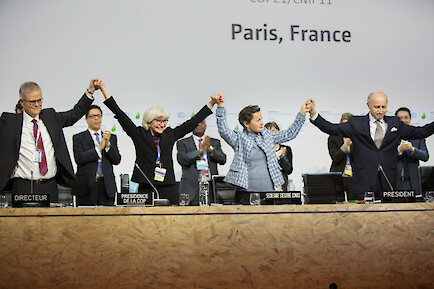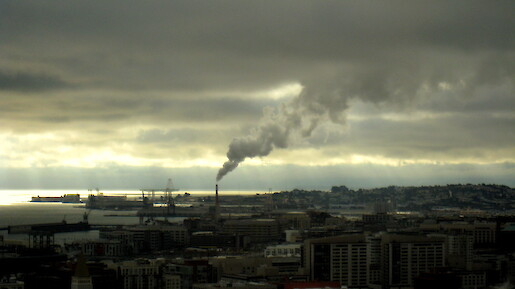Do we have the ABILITY to achieve SustainABILITY?
Matt Kusche · | MEES 620 Fall 2021 | 7 comments
Sustainability. What is it? When you think of sustainability, you may think of people like Jane Goodall or Greta Thunberg who are famous for their work as environmental activists. Or perhaps you may think of the 2015 Paris Agreement, which looked to tackle the environmental challenges that we face. As pointed out at the very beginning of our lecture by Xin Zhang, however, sustainability is a term that we often use a lot within our everyday lives, especially within a scientific setting, but may find it difficult to actually define. Well, when it was first used for forestry, based out of Germany back in 1713, it was used to represent the idea of “maintaining a balance between harvesting old trees and ensuring that there were enough young trees to replace them.”1 As Xin and Matthew Houser pointed out, the term “sustainability” has grown much more complex. At the Rio+20 Summit in 2012, they stated that in order to be sustainable around the world, we would need to be:
“promoting sustained, inclusive and equitable economic growth, creating greater opportunities for all, reducing inequalities, raising basic standards of living; fostering equitable social development and inclusion; and promoting integrated and sustainable management of natural resources and ecosystems that supports inter alia economic social and human development while facilitating ecosystem conservation, regeneration and restoration and resilience in the face of new and emerging challenges”2 – United Nations General Assembly

Is global sustainability really possible though? Is it realistic that we are going to become a sustainable society that works in conjunction with the environment? A large portion of our class was focused on just this, discussing whether or not being sustainable on a global scale was even a possibility. Some of the major arguments that were brought up looked at the fact that the way things are structured now from a societal perspective, it doesn’t seem likely. Specifically, some of the arguments that were made in relation to this were that there are things such as war, borders, lack of trust, societal norms, and possible scaling obstacles. All this together, it makes it seem like global sustainability is just a pipeline dream. However, that doesn’t mean there isn’t hope for a better tomorrow. Two important pieces from this lecture that struck a chord with me during this lecture were: First - Xin was closing out the conversation and she ended it by stating that while these conversations may seem depressing, Xin and Matthew enjoy doing this because these conversations are how we get progress to occur. This took me aback for a moment and really got me thinking about just what needs to occur to have sustainability possible. The second was when Dr. Rose talked about the necessity for trust if we ever hope to get anywhere alongside the need for action.

These statements made me reflect back to the Brundtland Report and how they identified and recommended these key areas that needed to be addressed back in 1987 in order to become sustainable.3 It is reminiscent of the ideas taken in the recent Rio+20 Summit and the 2015 Paris Agreement. At the Rio+20 Summit back in 2012, the United Nations were able to identify 17 SDGs that serve to make global sustainability possible by the year 2030. At the Paris Agreement, 196 parties signed to combat climate change through individualized NDCs. The goal of the Paris Agreement is to limit carbon emissions in order to prevent the Earth from warming by two degrees Celsius within this century.
While these are great reports and agreements for nations to make, it appears that something is missing. If we take a look at the most recent update in 2020 regarding the progress made in accomplishing the SDGs from the Rio+20 Summit, we can see we are not set to accomplish our goals. This is what the UN Secretary-General had to say on the matter:
“As Member States recognized at the SDG Summit held last September, global efforts to date have been insufficient to deliver the change we need, jeopardizing the Agenda’s promise to current and future generations. Now, due to COVID-19, an unprecedented health, economic and social crisis is threatening lives and livelihoods, making the achievement of Goals even more challenging.” – UN Secretary-General António Guterres.
The same can be seen in regard to the progress of the Paris Agreement. Based on research on the current projections, it does not appear we will stay below the two-degree limit set forth in the agreement.5 Even just looking at the US, we can see that we have encountered a number of obstacles in sticking with the Paris Agreement such as falling flat on state-level commitments and President Trump withdrawing the US from the Paris Agreement altogether.
Now you may be wondering how these are all connected to what was so striking in class. Well, it has to do with the fact that we concluded that we have the vision and goals in mind, and it seems like we understand that we have to work together in order to become sustainable. This can be seen from the Brundtland Report, the Rio+20 Summit, and the Paris Agreement. It is evident however between lectures, our readings, and real-life events, that we are unable to accomplish it right now. What I believe we lack is any real accountability in the measures we as nations have been setting forth. If we are to be able to tackle the environmental challenges that we face as a united front, we need to have accountability for the measures we take. There were no repercussions for the fact that we backed out of the Paris Agreement. There are no repercussions for the fact that deforestation has skyrocketed in Brazil. My point being, we have the vision that Ruth DeFries was referencing in her work.6 She showed that we have historically adapted and changed how we function to overcome our obstacles.6 Now we are trying to do it on the largest scale that we have ever seen before in order to combat problems that are in our near future, if not already feeling. In order to be successful in adapting our ways, we need to hold each other accountable. This will be the only way we can become globally sustainable.

My closing remark that I want you to ponder is this: Without accountability, if every nation in the world commits to becoming sustainable tomorrow, will it make one bit of difference?
References
- Du Pisani, J. A. (2006). Sustainable development – historical roots of the concept. Environmental Sciences, 3(2), 83–96. https://doi.org/10.1080/15693430600688831
- United Nations. (n.d.). Future we want - outcome document .:. sustainable development knowledge platform. United Nations. Retrieved October 9, 2021, from https://sustainabledevelopment.un.org/futurewewant.html.
- World Commission on Environment and Development. (1987). Our common future. Oxford: Oxford University Press
- United Nations. (2020). Sustainable development goals report – united nations sustainable development. United Nations. Retrieved October 9, 2021, from https://www.un.org/sustainabledevelopment/progress-report/.
- Cornwall, W. (2020). The Paris climate pact is 5 years old. is it working? Science. https://doi.org/10.1126/science.abg1263
- DeFries, R. S. (2014). In The big ratchet: How humanity thrives in the face of natural crisis(pp. 1–33). essay, Basic Books.
About the author
Matt Kusche

Matthew is a second year master’s student in the Ecological Systems Foundation of the MEES program. His research focuses on analyzing and quantifying the different types of phytoplankton that exist in various sites throughout the Chesapeake Bay. He enjoys fishing, camping, and living on islands to pass the time.
Next Post > My Introduction to Chesapeake Bay
Comments
-
Bill Dennison 4 years ago
Matt, You did an amazing job discussing the concept of sustainABILITY. Your conclusion that the international Sustainable Development Goals (SDGs) need a form of accountability is spot on. I would add that they need both transparency and accountability. Reading the excerpt of the United Nations SDG document that you chose also stimulated me to look up the Latin term 'inter alia', meaning 'among other things' (you can tell that the SDG document was written by lawyers). Our class discussion that Xin Zhang and Matt Houser catalyzed was extremely wide ranging, covering topics as diverse as environmental justice, guano wars, equitable market choice, trust & behavior, dietary choices, food systems, political systems, plastics in the environment, and electric cars. Clearly, the topic of sustainability means many different things to people and your version of what sustainability means is thoughtful and relevant. Bill
-
Nick Dawson 4 years ago
Matt,
I thoroughly enjoyed your post on sustainability this week. Last week's lecture and your blog helped me think more on how I want to tackle the plastic pollution problem in my research. As we know, plastics, specifically microplastics, is a growing environmental problem. Moreover, the consumption and manufacturing of plastic products is not sustainable. I have done some research on plastic pollution when I was working on masters. I believe that in order to be sustainable in this plastic age, we need create behavioral changes. Whether that is through monetary incentives that deter consumers from buying plastic products, reusable bags, or new and innovative packaging products. -
Shuyu Jin 4 years ago
Hi Matt, I like your sobering thought at the end. It's not only about sustainability but also climate change. Although the data and reports support global climate change, countries differ significantly in their sense of responsibility and mission. If these global issues remain the actions of some and some voices, we are far from victory. So I appreciate your mention of accountability. How to implement accountability is another thorny issue.
-
Barry 4 years ago
Matt,
I appreciate your interrogative approach to your blog. It makes someone think more actively about the information you are sharing. I often feel that meeting sustainability goals can seem like a pipe dream, but I know that human society is becoming more cognizant of these issues. People excel at adapting to new crises, and I trust that, as more people are affected by global changes, the drive and support to address these issues will increase. To echo Nick's comment, the best way for us, as individuals, to contribute to SDGs is to adopt more sustainable behaviors.
I try to buy only fresh produce or products that come in recyclable or reusable packaging. One of the easiest changes I made was to stop buying plastic trash bags altogether. If I ever need a trash bag, I can reuse a container that something else I bought came in. Furthermore, the simple act of sharing these tips and tricks, on a larger scale, can influence shifts in social perceptions, which can affect decisions of world leaders.
Think globally, act locally. -
Nicole Holmes 4 years ago
Matt!!!
This is so great. For a long time, I wasn't really sure what I meant when I would say, " I know we can treat our planet better, but there's something missing that's going to make it actually happen." You hit the nail right on the head: Accountability! To be honest, if you think about who really has the money and time of day to change our livelihoods (as well as the fact that its their job...), it's the government and big business. We need to hold THEM accountable, considering the fact that they are the majorly responsible parties that shape our society. Both decide what makes money, what social norms are, and what LAWS and MANDATES are put into place (one of these things just doesn't belong here!). As I will continue to say for the rest of my life (mostly so I can sleep at night) I'm going to do what I can to make a difference, whether its being an example in my own personal life or using my education to continue fighting for our Earth Mother. Thank you for fighting for our Earth Mother too.
Nicole
-
Yanyu Wang 4 years ago
Hi Matt!
Thank you for synthesizing the great discussion we had about sustainability. There do still numerous barriers to achieve sustainable development globally by involving all the countries around the world. Yeah, I agree with your point regarding the accountability but wondering who should be the one conducting the accountability. How should we guarantee the equal justification regarding accountability for each country instead of bringing more injustice? I think this might not be the only way of achieving sustainability, we have a lot to do as well, but thanks for bringing this up, and we can think more about it.
-
Imani Black 4 years ago
Like I said in class, great blog Matt! I liked how you included questions that came up from your thoughts during class and some that came from others. There's was a lot capture in that conversation since sustainability is a very complex issue in the world for so many resources but I think you nailed it. To answer your closing question, I think that those efforts could/would make a difference overall but as we've seen in our time in class, there's never one aspect or perspective that dominated topics or conversations. As we saw in 2020 when there were less cars and people constantly in motion, the environment quickly changed. I think if everyone around the world committed to positive changes towards our environment we would have to all be on the "same page" as far as what that looks like for each society and how that contributes to the overall goal. Which in itself is its own difficult task.